Mobile showers for the homeless were created by a guy who was afraid of people on the streets

NASHVILLE, Tenn. – He couldn’t use his regular fire hydrant across from the homeless encampment – tornado winds ripped up a giant tree and smashed it against the hydrant, knocking it out of service.
So Paul Schmitz parked his three-shower trailer a block away from the Jefferson Street bridge that about 50 people call home.
Wearing black nitrile gloves and a mask covering his mouth and nose, Schmitz gleefully set up a new hand-washing station.
“My approach today is a hands-first philosophy,” Schmitz said as five people drifted over from under the bridge. “Clean your hands, and we’ll go from there.”
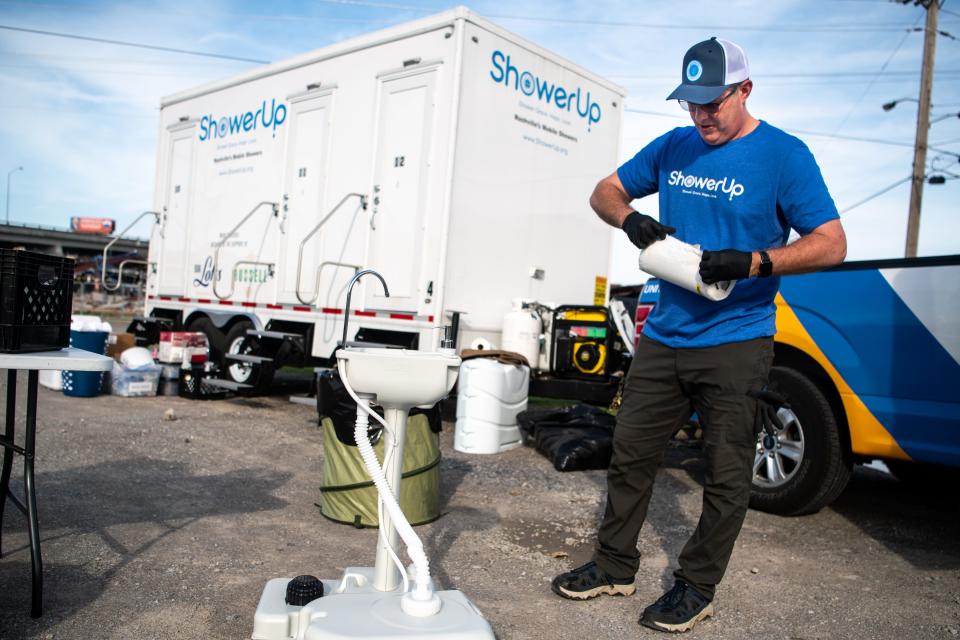
Quickly setting up, he shouted greetings to those arriving.
“Nathan!” Schmitz sang out to a regular, Nathan Rice, 40.
The two exchanged huge smiles and an awkward elbow bump.
Despite his enthusiasm, Schmitz, 54, the affable founder of ShowerUp, is tired.
He has worked almost every day to provide showers to Nashville’s homeless since the tornado and COVID-19 hit.
The need for showers grew in that time since two of the organizations that typically provide them to the homeless – the YMCAs and Room in the Inn – shut down or cut back services.
Schmitz operates the mobile showers without his usual army of volunteers because he wants to protect them from exposure to the virus.
With one helper, Schmitz greets and connects with the homeless using ShowerUp’s mobile facilities.
The former radio executive bonds with those in a community he once ignored and sometimes feared.
'What else ya got?'
Like many teenagers in the '70s and '80s, Schmitz couldn’t stop listening to pop radio, including those Casey Kasem countdowns.
Unlike many of his friends, Schmitz, a regular at church, started listening to Christian rock and pop pioneers, including Larry Norman and Randy Stonehill. He sang along to their songs while riding in the car, cutting the grass or shooting hoops in his driveway in his hometown of Peoria, Illinois.
Schmitz scored a dream gig toward the end of high school: He got $1.85 an hour on the air at Christian station WPEO in Peoria, playing records on weekends and holidays.
That launched a decades-long career as on-air personality Paul Anthony. Schmitz became a Christian radio network exec in 2005.
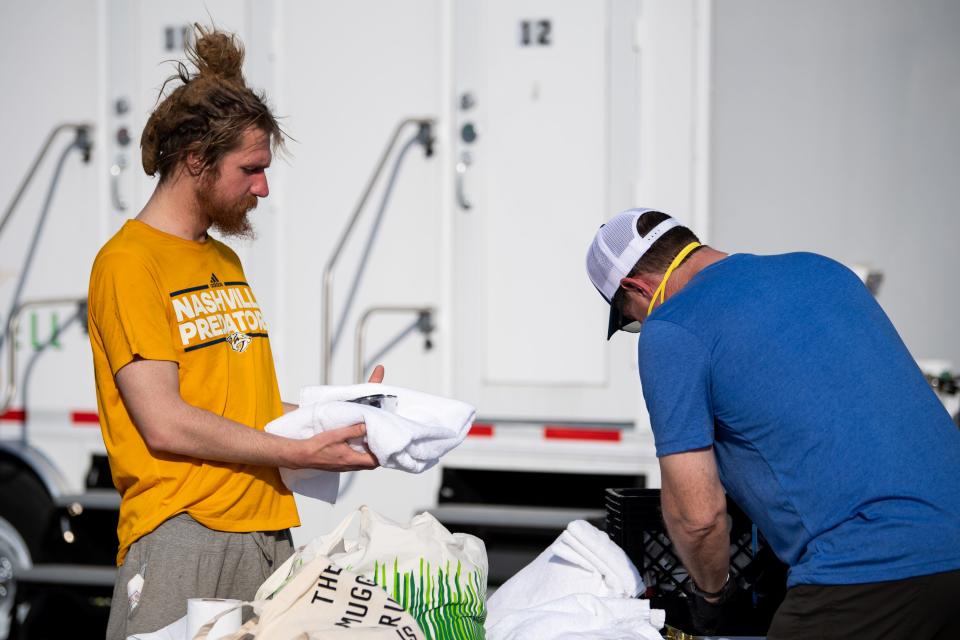
He said he believed in Christian principles, talked about them on and off the air, even helped organize winter coat drives for the needy with his radio network.
But Schmitz always felt uncomfortable when homeless people asked him for money on the street outside his corporate offices in downtown Wichita, Kansas. He warded them off with an awkward “no thanks.”
“I didn’t know how to engage folks that were on the street, and that paralyzed me from doing anything meaningful,” he said. “I had compassion, and I had concern, but I didn’t know how to act on it.”
One day, Schmitz was getting out of his work-issued Toyota 4Runner wrapped with the station logo, and a homeless woman in her 40s asked him for money.
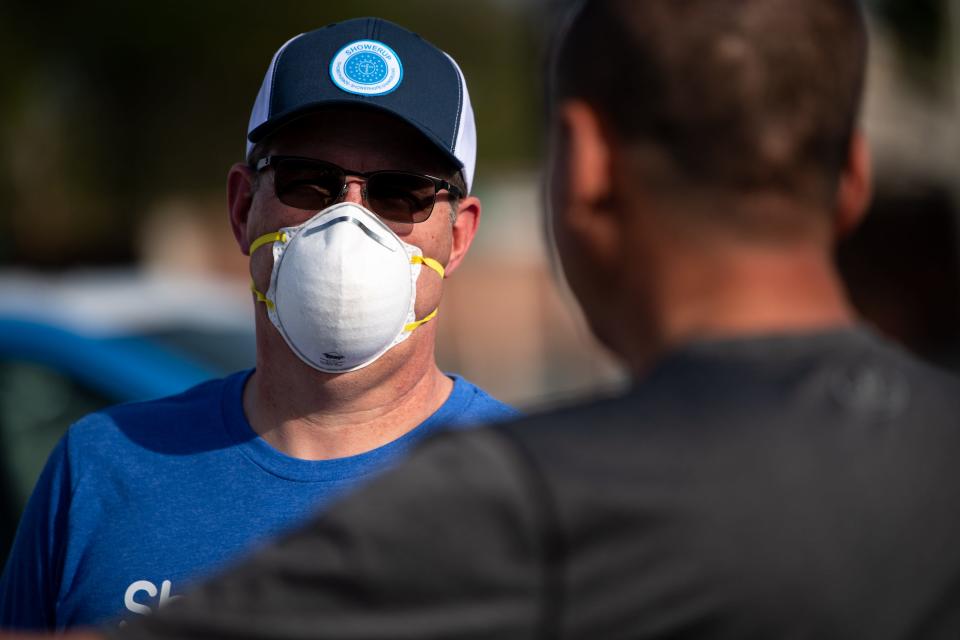
Schmitz handed her $2, and she said in an insistent, raspy voice, “What else ya got? What else ya got?”
The 6-foot-2-inch Schmitz immediately got back in his car, closed the door and waited for her to leave.
“I’m inferring something menacing. I remember in that moment feeling like I need to get out of this situation, right now,” he said.
Schmitz questioned himself for weeks afterward, wondering if he overreacted, if he missed an opportunity to be of service.
Handing out sack lunches
After getting married in 2007, Schmitz and his wife adopted three sisters, and they wanted to teach the girls basics about kindness and helping others.
Schmitz was reading two books that sparked his desire to serve to a new level, "Crazy Love" by Francis Chan and "Not a Fan" by Pastor Kyle Idleman.
After a night of pacing and prayer, Schmitz told his wife he wanted to pack some brown bag lunches and hand them to homeless people downtown.
His wife, Rhonda, responded, “When do you want to start?”
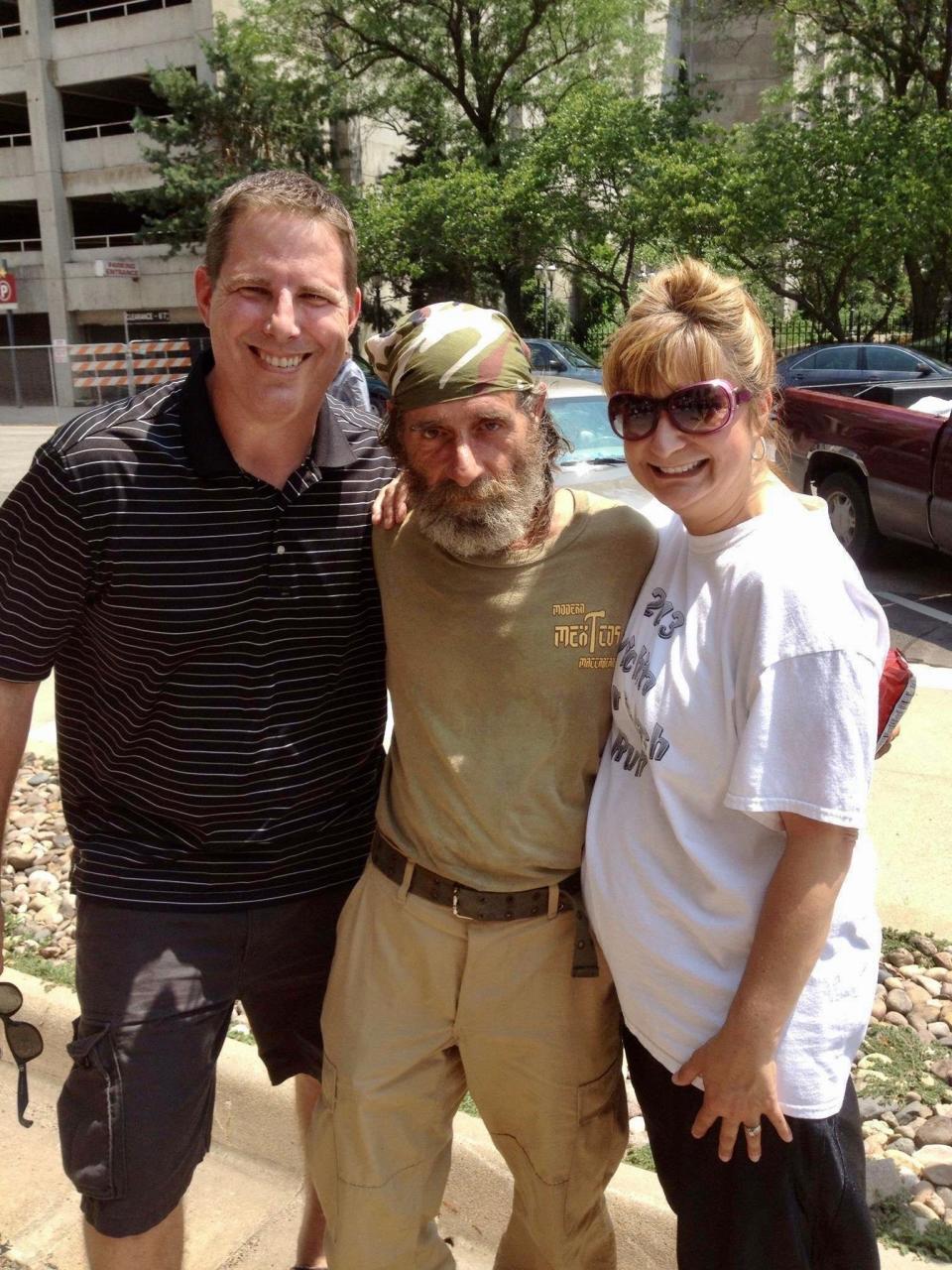
That Sunday after church, Schmitz, his wife and their daughters packed into their black Toyota minivan, drove downtown and passed out 25 bags through the van windows. Inside were peanut butter and jelly sandwiches, chips, homemade brownies, bottled water and napkins.
“The vibe in the van was we felt like we’d done something important for our family,” Schmitz said.
His wife said, “It was a good thing.”
The next week, the family got out of the van and handed 35 sack lunches to homeless people, having brief conversations with each.
Over the next three months, church volunteers joined the Schmitz family and more than 50 sack lunches were being handed out. Conversations got longer.
Schmitz and the church volunteers decided to set up locations to have the homeless eat and talk and make it a community gathering. The volunteers named it People Loving Wichita.
Volunteers brought big boxes of fried chicken, hot dogs, chili and hamburgers, and more than 250 meals were served each week. Those meals opened doors to connection.
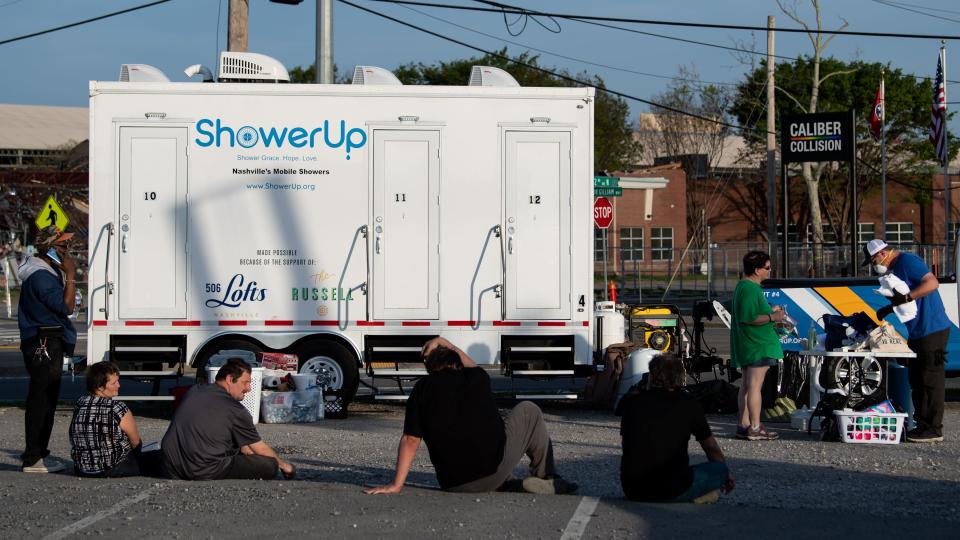
“The food was simply a handshake, but relationship was the most important thing,” Schmitz said. “With relationship, you have opportunity to make a difference in someone’s life.”
The difference is combating the feeling many homeless people have that they don’t matter.
“The isolation created when you are homeless is not just physical; it’s emotional, it’s spiritual. When that happens, it’s easy to think that your friends and family don’t care and don’t want anything to do with you,” Schmitz said.
A new radio network job brought Schmitz to Nashville in 2013, and he and his family jumped into volunteering for a Monday night homeless ministry called People Loving Nashville.
'No, I'm not'
Schmitz and his wife heard often from homeless people that they wanted to feel clean, to have access to showers, but he had no idea how to fill that need.
Then Schmitz saw a post on his Facebook feed about an upscale mobile shower unit that was part of a high-end outdoor hospitality event.
“I heard in my heart and in my mind three words – ‘You’re doing that,’ ” Schmitz said. “And I said out loud, ‘No I’m not.’ ”
But Schmitz, convinced he received a message from God, decided to move forward. He uttered one of the most unusual sentences he has ever said to his wife:
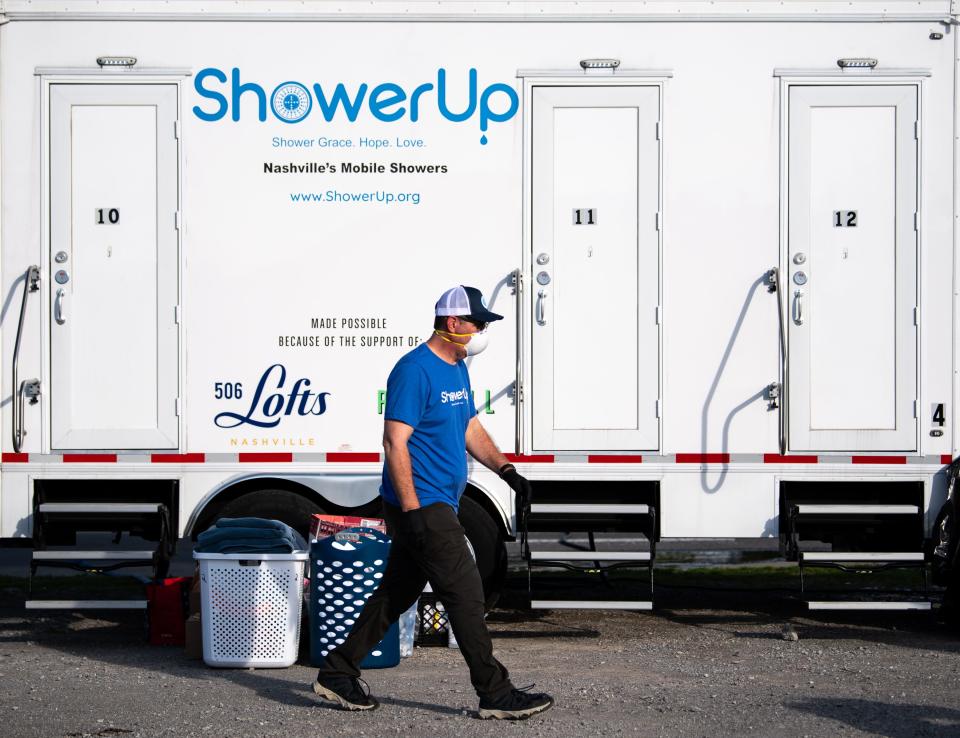
“I think God wants us to do a shower truck for the homeless.”
Her first reaction:
“Ummmmmmm … we have no money.”
Then the questions: Where would they get such a truck? How would they do this when they both worked full time? Did they need permission from the city?
Rhonda said her husband had no answers, but he was determined.
“His tone was, ‘This is what we have to do.’ It wasn’t a bossy tone at all. It was a matter-of-fact tone. ‘We have zero choice right now,’ ” she said. “He knew it was going to work out. He just knew.”
Schmitz gathered information and started fundraising, first through friends and family. Eventually, he got $20,000 for a box truck and got a plumbing company to build it out for a fraction of what it would normally charge.
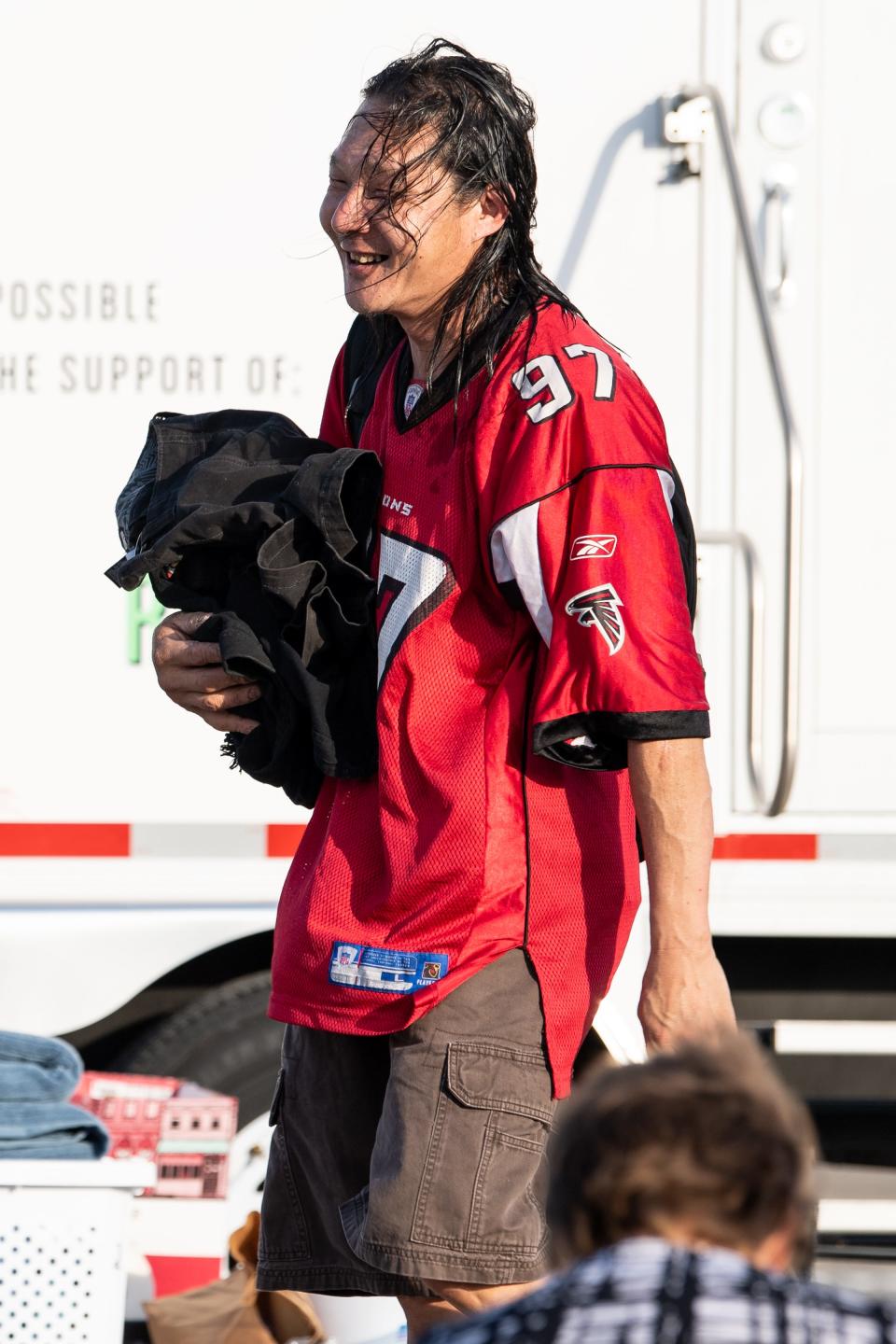
The shower stalls are roomy, 6 feet by 4 feet, and there is a separate changing area, so clients won’t feel cramped.
Schmitz started collecting from friends travel-size toiletry items – soap, shampoo, toothpaste, toothbrush, shaving cream, razors.
After debuting the showers at the Monday night People Loving Nashville gathering, Schmitz said he heard from folks who hadn’t had a shower for weeks or months.
Thomas Lineweaver, 31, a writer/blogger who has lived on the streets for 10 years, said, “A shower is important because it helps me feel clean, rejuvenated.”
ShowerUp, with the help of the Predators Foundation and others, has a box truck and three mobile shower trailers that make about three to four stops a week.
The showers build the type of relationships Schmitz and his wife hoped for.
Rice, who lives in the Jefferson Street encampment, said, “It feels great to get cleaned up. Paul is a good friend.”
Follow Brad Schmitt on Twitter @bradschmitt.
This article originally appeared on Nashville Tennessean: Tennessee man operates mobile showers for homeless amid coronavirus
